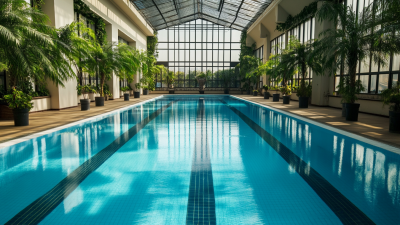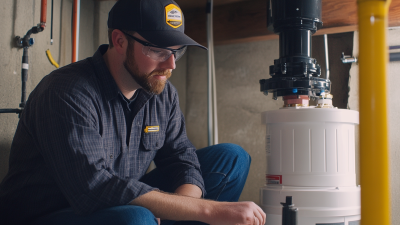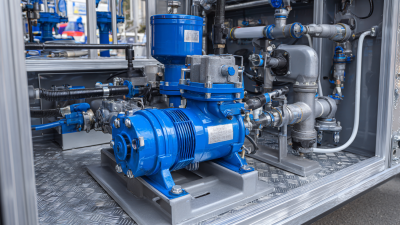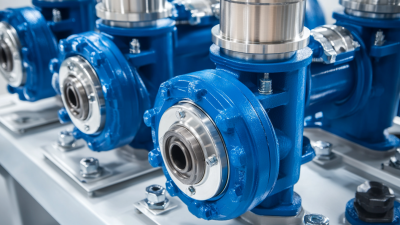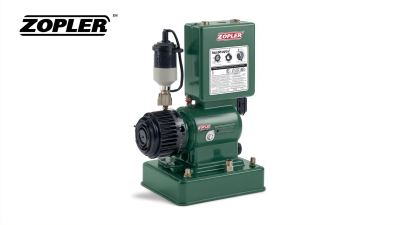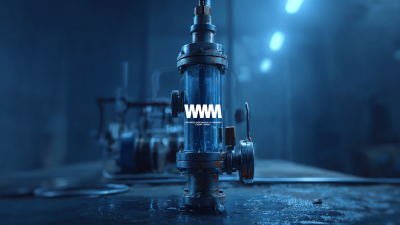


Choosing the right pool pump is essential for maximizing your swimming experience and ensuring the longevity of your pool system. According to the Association of Pool & Spa Professionals, effective water circulation is crucial—over 50% of pool owners reported issues related to inadequate water flow, leading to algae growth and poor water quality. Additionally, the Department of Energy estimates that upgrading to a high-efficiency pool pump can reduce energy costs by up to 70%, significantly benefiting both the environment and your wallet. By investing in a suitable pool pump, you not only enhance your swimming environment but also contribute to cost-effective pool maintenance and lower energy bills. In this blog, we will explore the myriad advantages of selecting the right pool pump, offering insights and tips to help you make an informed decision that aligns with your swimming needs.

When selecting a pool pump, understanding the different types available is crucial to optimizing your swimming experience. The primary categories of pool pumps include standard pumps, variable speed pumps, and solar-powered pumps, each offering distinct functionalities tailored to various pool needs. A variable speed pump, for instance, can significantly reduce energy costs, with studies showing that they can lower electricity use by up to 80% compared to traditional single-speed pumps. This makes them not only eco-friendly but also cost-effective over time.
Moreover, solar-powered pumps are gaining popularity due to their sustainability and independence from the electrical grid. These pumps harness solar energy, making them an ideal choice for those looking to minimize their carbon footprint. In regions with abundant sunlight, solar pumps can operate efficiently, reducing reliance on conventional energy sources. Reports indicate that as the technology evolves, these pumps will feature enhanced durability and versatility, ensuring they meet the demands of diverse swimming environments. Understanding these differences can help pool owners make informed decisions that enhance their maintenance routines and overall enjoyment of their swimming pools.
When selecting a pool pump, several key factors can significantly impact your swimming experience and the overall efficiency of your pool. One critical consideration is the pump's flow rate, measured in gallons per minute (GPM). According to the Pool & Hot Tub Alliance (PHTA), a pump should ideally circulate all the water in a pool within 8 hours. For example, a 20,000-gallon pool requires a pump with a flow rate of around 42 GPM. Ensuring you choose the right flow rate not only affects water quality but also influences energy consumption, as a well-sized pump operates more efficiently.
Another important factor is the type of pool pump. Variable-speed pumps, as highlighted in the "2022 Pool Pump Efficiency Report" by the Department of Energy, can reduce energy costs by up to 80% compared to traditional single-speed pumps. This transition not only helps in reducing utility bills but also extends the lifespan of the pump, as they can run at lower speeds for filtration and higher speeds for specific tasks, like vacuuming or water features. Ultimately, understanding these key elements will lead to a more enjoyable swimming experience while maximizing your investment in pool maintenance.
This chart illustrates the importance of various factors when selecting a pool pump for an optimal swimming experience. Energy efficiency is rated the highest, followed by circulation efficiency and lifespan, while noise level and maintenance cost hold slightly lesser significance yet remain crucial in the decision-making process.
When it comes to enhancing your swimming experience, the efficiency of your pool pump plays a crucial role in managing energy costs. An efficient pool pump not only circulates water effectively but also minimizes energy consumption. By selecting a pump with a higher efficiency rating, homeowners can reduce their overall energy bills while ensuring that their pool remains clean and pleasant to swim in. The financial savings accrued from a efficient pump can be significant over time, making it a wise long-term investment.
In addition to cost savings, an efficient pool pump helps in reducing the environmental impact of your swimming pool. By using less energy, you decrease your carbon footprint, contributing to a more sustainable lifestyle. Furthermore, modern pool pumps often come with variable speed options, allowing users to adjust the flow rate according to specific needs. This adaptability not only enhances the pool’s filtration system but also leads to further energy conservation. Ultimately, choosing the right pool pump is a key step towards a cost-effective and eco-friendly swimming experience.

Maintaining your pool pump for optimal performance is crucial for enjoying a pristine swimming experience. A well-maintained pool pump ensures proper circulation and filtration, which keeps the water clean and safe for swimming. Regular checks on your pump can head off potential issues such as clogs and leaks, which can lead to costly repairs and diminish your pool's enjoyment. Some automatic pool cover pumps come equipped with built-in sensors that automatically activate to manage water levels and keep your pool safe from debris accumulation.
To further enhance the efficiency of your pool maintenance routine, consider incorporating advanced technologies like AI inverter pumps. These innovative pumps adapt to usage patterns and environmental conditions, optimizing energy consumption and reducing noise. Alongside regular maintenance, integrating high-quality automatic pool cleaners or vacuum robots can take away the tedious manual labor involved in keeping your pool clean, allowing you to spend more time relaxing in your backyard oasis. By prioritizing proper maintenance and investing in effective cleaning solutions, you can ensure your pool remains a delightful retreat throughout the season.

Choosing the right pool pump is crucial for enhancing your swimming experience. According to a report from the Association of Pool & Spa Professionals, a properly sized and efficient pump can improve water circulation and filtration, reducing the need for chemical treatments. This not only keeps your pool crystal clear but also creates a healthier swimming environment. For example, a well-functioning pump can increase the turnover rate, ensuring that the entire volume of pool water is filtered at least once per day, which is essential for maintaining water quality.
Furthermore, energy efficiency plays a significant role in your overall pool maintenance costs. The U.S. Department of Energy states that pool pumps account for roughly 40% of a household's energy use related to recreational water use. By selecting a variable-speed pump, homeowners can reduce their energy consumption by up to 80% compared to traditional single-speed models. This not only lowers utility bills but also contributes to a more sustainable swimming experience, allowing you to enjoy your pool while minimizing your environmental footprint. In short, making an informed pump choice maximizes both your swimming enjoyment and your energy savings.
